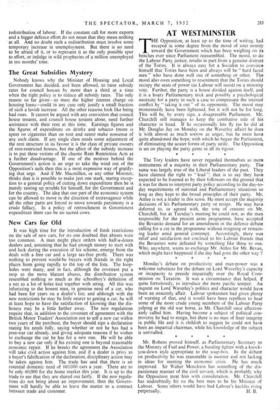AT WESTMINSTER T HE Opposition, at least up to the time
of writing, had escaped in some degree from the mood of sour enmity toward the Government which has been weighing on its benches ever since Parliament reassembled. The mood, to do the Labour Party justice, results in part from a genuine distrust of the Tories. It is always easy for a Socialist to convince himself that Tories have been and always will be " hard faced men " who have done well out of something or other. The mood also owes something to resentment that the Tories should occupy the seats of power (as Labour will insist) on a minority vote. Further, the party is a house divided against itself, and it is a hoary Parliamentary trick and possibly a psychological necessity for a party in such a case to compensate the internal conflict by " taking it out " of its opponents. The mood may momentarily have been lightened, but it will not be for long. This will be, by every sign, a disagreeable Parliament. Mr. Churchill still manages to keep the combative side of his character in hand. If he occasionally lets fly (as he did at Mr. Douglas Jay on Monday on the Waverley affair) he does it with almost as much sorrow as anger, but he must have quite abandoned the hope, with which he began the Parliament, of eliminating the acuter forms of party strife. The Opposition is set on playing the party game in all its rigour.
* * * * The Tory leaders have never regarded themselves as mere instruments of a majority in their Parliamentary party. Tho same was largely true of the Liberal leaders of the past. They have claimed the right to " lead "; that is to say they have expected to be listened to by their followers on the ground that it was for them to interpret party policy according to the day-to- day requirements of national and. Parliamentary situations so long as they kept to the broad principles of their party. Mr. Attlee is not a leader in this sense. He must accept the majority decisions of his Parliamentary party or resign. He may have deferred to, or agreed with, the vote of censure on Mr. Churchill, but at Tuesday's meeting he could not, as the man responsible for the present arms programme, have accepted the Bevanite demand for an amendment in the defence debate calling for a cut in the programme without resigning or remain- ing leader amid general contempt. Accordingly, there was relief and satisfaction not confined to his Labour friends that the Bevanites were defeated by something like three to one. Who, anywhere, wants to exchange Mr. Attlee for Mr. Bevan, which might have happened if the day had gone the other way ?
* * * *
Monday's debate on productivity and man-power was a welcome substitute for the debate on Lord Waverley's capacity or incapacity to preside impartially over the Royal Com- mission on Taxation. It was a circumstance that helped, if quite fortuitously, to introduce the more pacific temper. An inquest on Lord Waverley's politics and character would have been an unseemly affair. Labour spokesmen had given plenty of warning of that, and it would have been repellent to hear some of the more crude young members of the Labour Party yelping at the old war horse, as Mr. Churchill once affection- ately called him. Having become a subject of political con- troversy he had to resign, but there is no man of finer integrity in public life and it is childish to suggest he could not have been an impartial chairman, while his knowledge of the subject is unrivalled.
* * * *
Mr. Robens proved himself, as Parliamentary Secretary to the Ministry of Fuel and Power, a bustling fighter with a knock- you-down style appropriate to the soap-box. In the debate on productivity he was reasonable in manner and not lacking in ideas for meeting the economic crisis. He has much improved. Sir Walter Monckton has something of the dis- passionate manner of the civil servant, which is probably why the Opposition treat him with consideration. Mr. Churchill has undoubtedly hit on the best man to be his Minister of Labour. Some others would have had Labour's hackles rising


































 Previous page
Previous page